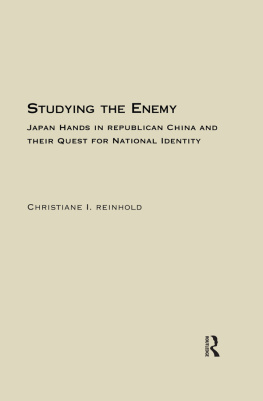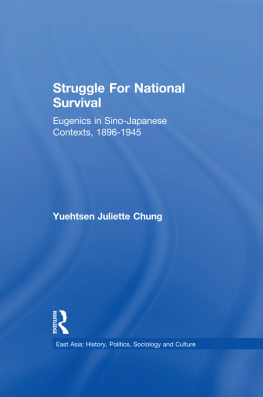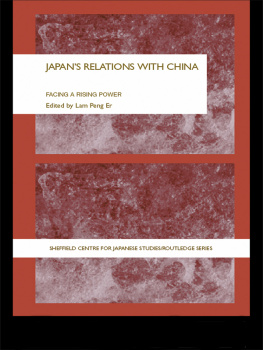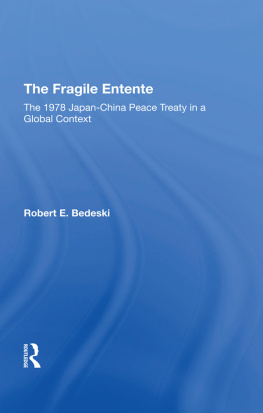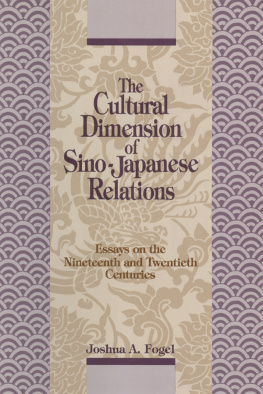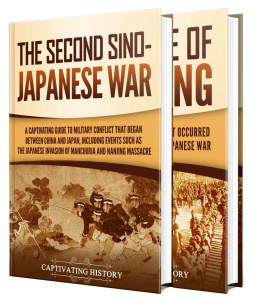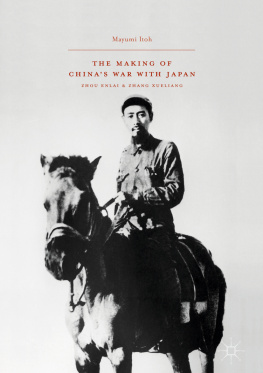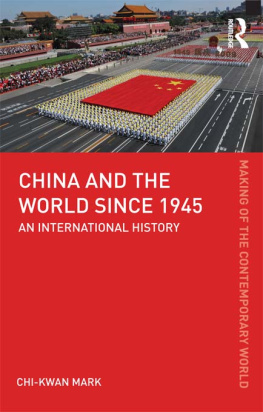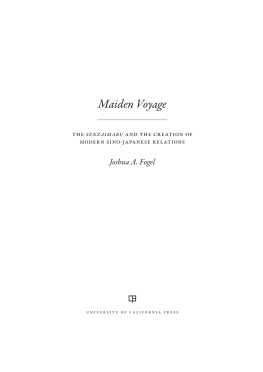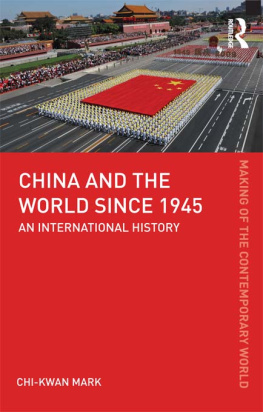E AST A SIA
H ISTORY , P OLITICS , S OCIOLOGY , C ULTURE
E DITED B Y
E DWARD B EAUCHAMP
U NIVERSITY OF H AWAII
A R OUTLEDGE S ERIES
E AST A SIA
H ISTORY , P OLITICS , S OCIOLOGY , C ULTURE
E DWARD B EAUCHAMP , General Editor
M ODERN E DUCATION , T EXTBOOKS, AND THE I MAGE OF THE N ATION
Politics and Modernization and Nationalism in Korean Education: 18801910
Yoonmi Lee
P ROBLEMS OF D EMOCRATIZATION IN C HINA
Thomas G. Lum
T HE U NKNOWN C ULTURAL R EVOLUTION
Educational Reforms and Their Impact on Chinas Rural Development, 19661976
Dongping Han
M AOS P REY
The History of Chen Renbing, Liberal Intellectual
Jeanette Ford Fernandez
T HE R OOTS OF J APANS E NVIRONMENTAL P OLICIES
Amy Wong
T HE O RIGINS OF THE B ILATERAL O KINAWA P ROBLEM
Okinawa in Postwar US-Japan Relations, 19451952
Robert D. Eldridge
South-South Transfer
A Study of Sino-African Exchanges
Sandra Gillespie
S TUDYING THE E NEMY
japan Hands in Republican China and Their Quest for National Identity
Christiane I. Reinhold
Published in 2001 by
Routledge
29 West 35th Street
New York, NY 10001
Published in Great Britain by
Routledge
11 New Fetter Lane
London EC4P 4EE
Routledge is an imprint of the Taylor & Francis Croup
Copyright 2001 by Christiane I. Reinhold
All rights reserved. No part of this book may be reprinted or reproduced or utilized in any form or by any electronic, mechanical, or other means, now known or hereafter invented, including photocopying and recording, or in any information storage or retrieval system, without permission in writing from the publisher.
10 9 8 7 6 5 4 3 2 1
Library of Congress Cataloging-in-Publication Data
Reinhold, Christiane I., 1965-
Studying the enemy : Japan hands in Republican China and their
quest for national identity / by Christiane I. Reinhold.
p. cm. (East Asia : history, politics, sociology, culture)
Includes bibliographical references and index.
ISBN 0415931827
1. JapanStudy and teachingChina. 2. JapanologistsChina.
3. ChinaHistoryRepublic, 19121949. I. Title. II. East Asia
(New York, N.Y.)
DS834.95 R35 2001
952007051dc21
2001034797
T HERE ARE MANY TO WHOM I AM INDEBTED FOR HELPING SMOOTH THE COURSE of this project. I would like to single out several individuals who were instrumental to the successful completion of my work.
First and foremost my thanks are due to Professor Edward J. M. Rhoads, my dissertation supervisor, who kept me "on my toes" and taught me, a classically-trained Sinologist, to navigate confidently in modern Chinese history. I have also benefited from the insights of Professors Susan Burns and, more recently, Margherita Zanasi and Edward Beauchamp and the interest they have shown in my work. I would also like to express my gratitude to Professors Robert Divine, Philippe Fort, and Patricia Stranahan for serving on my committee.
I would like to thank Professors Avraham Altman (Hebrew University of Jerusalem), Steve Beck (University of California, Davis), Vivian Blaxell (Marlboro College, VT), Robert Culp (Cornell University, Ithaca), Earl H. Kinmouth (University of Sheffield, UK), Liu Xinru (Chinese Academy of Social Sciences, Beijing), and Lu Yan (University of New Hampshire) for their input and advice. I owe a debt of gratitude especially to Professors John J. Fitzgerald (LaTrobe University) and Mark Selden (State University of New York, Binghamton), who sent me copies of their own work for my perusal.
I am also deeply grateful to the librarians here in the United States, the People's Republic of China, and Japan, who helped me locate and obtain many of the obscure sources I used in my work. My thanks go foremostly to Kevin Lin (The University of Texas at Austin), but also to Julia Tung (East Asian Collection, Hoover Institute), Zhou Liling (National Library of China, Beijing), Dr. Shinohara Mutsumi (China Research Institute, Tokyo), Takahashi Noboru (Waseda University Library), and Jido Sayoko (Kyoto University Library).
I would also like to acknowledge the financial support I received in the form of grants from Mitsubishi and the Dora Bonham fund, which helped defray the costs of research.
For the last year of research and writing, the "gang" of editors of H-ASIA, especially Professor Marilyn A. Levine, kept up my spirits and cheered me on to the completion of my work. Thanks to you all.
Many thanks to my editors at Routledge, Farideh Kamali and John Shea, for their painstaking efforts and guidance ,in the publication of this work.
Finally, thanks are due to my family, especially my parents-in-law, Professor David F. Marshall and Ruth A. B. Marshall, not only for painstakingly editing and proofreading my work, but also for their constant encouragement, and my husband, Michael J. Marshall, who demonstrated unflagging patience, affection, and support throughout.
B ASED ON THE WRITINGS OF TEN SELECT C HINESE J APAN HANDS OF THE Republican period, this work documents the rapid progress made in the Japan discourse regarding its high quality and quantity accompanying China's modern transformation. Closely related to the story of China's modernization, the work also argues that the Chinese proceeded on a journey of self-discovery through the intellectual "encounter" with the "enemy." In its course, the Japan hands revealed their private musings on their future as Chinese, envisioning China entering into the family of nations while retaining a distinct Chinese identity.
The first chapter, A History of the japan Discourse in China from It's Beginnings to 1928, provides an outline history of the Japan discourse from its beginnings in early imperial China, leading all the way up to the 1920s. Over this time, Chinese writings on Japan were highly derivative, failing to correspond to geopolitical realities. The Chinese cultivated a perception of the Japanese that was characterized by cultural arrogance and bias. In the late nineteenth century, the successful Meiji reforms in Japan led a group of Chinese, mostly diplomatic staff stationed in Japan, to question the traditional Chinese attitude of arrogance and conceit towards Japan. This perceptional shift prepared the stage for the emergence of the Japan discourse in the 1920s.
The Study of japan in Republican China: An Overview, the second chapter, introduces the main protagonists of the Japan discourse and assesses their significance for Japan studies in Republican China. Part One identifies the three distinct groups of Japan hands, the wenren, traditional Chinese literati, officials and supporters of the Guomindang, and cadres and supporters of the Chinese Communist Party then still in its infancy. Their personal backgrounds and ideological convictions explained the different approaches and perspectives from which the japan hands constructed their vision of Japan and, in turn, of a modern China.

